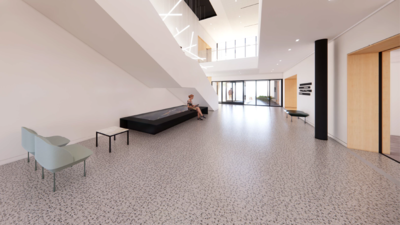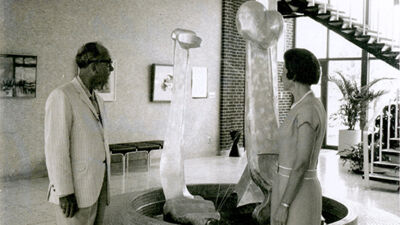Koi pond to return in new Music Center

By Scott Seevers
Senior Director of Development and Engagement
Thanks to emeriti professor Charles Ore, when Concordia’s Music Center re-opens in Fall 2022, faculty and students will be greeted by several aquatic residents of the former facility. Yes, returning from a temporary stay at Dr. Ore’s personal property outside of Seward, several koi will once again swim in a display pond on the main floor of the Music Center.
Koi, an ornamental fish popular in Japan, are hearty, colored varieties of the Amur carp. Often used in decorative outdoor ponds, koi varieties have been bred for desirable ornamental characteristics since the 19th century.
Concordia’s koi pond plans represent a connection to the Music Center’s past, says Ore, and they fulfill a purpose for its future as well. “We need some art,” Ore told the Music Center architects prior to construction of the new building. They agreed and, with funding provided by Ore himself, planning commenced for a rectangular, above-ground pond feature that will contain four or five living fish and several decorative brass koi. “The architect,” says Ore, “did a good job.” In an aesthetically pleasing building where music and drama activity will already bless the campus community, the koi pond will serve as a distinctive visual enhancement to the space.
There is some koi pond history from the previous music building and, as one might expect, Ore played a prominent role in it. When it originally opened in 1966, the Music building's main lobby contained a prominent and eye-pleasing sculpture. Water flowed through three components of the sculpture with a delightful effect. “It was very attractive at first,” notes Ore. However, the material used for the sculpture wasn’t entirely compatible with the water.

Over time, holes in the sculpture became clogged with deposits from the flowing water. The water subsequently overflowed, flooding the surrounding area. Some mornings, faculty would arrive and find the entire lobby flooded. “It was like Venice,” Ore recalls. After failed attempts to remedy the issue with chemicals that discolored the sculpture, the entire feature was eventually replaced. The pool was filled with sand, stone and plants and stayed that way for years.
Then, in the early 1990s, Ore became chair of the Music department. One day he was lamenting the lobby’s desert-like feature when his son-in-law suggested turning the space into a koi pond. Ore liked the idea and, without forming a committee to study the idea, or asking permission, he acted swiftly to make it happen. “I just did it,” he recalls with a mischievous smile. In one weekend, he purchased fiberglass tanks with filters and aerators and, he recalls, “I think the fish flew out from Chicago. My son-in-law flew his plane.”
When faculty and students returned to the Music building on Monday morning, Concordia had its first koi pond. “Everyone liked it,” says Ore, mentioning that it quickly became one of the most popular stops during prospective student campus tours. While Ore typically handled daily feeding of the koi and the occasional maintenance of the filters and equipment, he never had a shortage of student or faculty volunteers to assist with those duties. The koi played a role in building community within the music building.
Fundraising continues for the new Music Center, set to open for classes in August 2022. In addition to raising $17 million for construction costs, the project includes plans for an Excellence Endowment, eventually providing over $65,000 annually for the ongoing excellence of the facility, its technology, instruments and, yes, even a small fish habitat.
The new koi pond will be located near the stairs on the main floor of the new facility. Ore anticipates that, much like he witnessed with the previous koi pond, people will be enamored with it. “With just four fish and some water,” he says with a twinkle in his eye, “suddenly you have an attraction.”